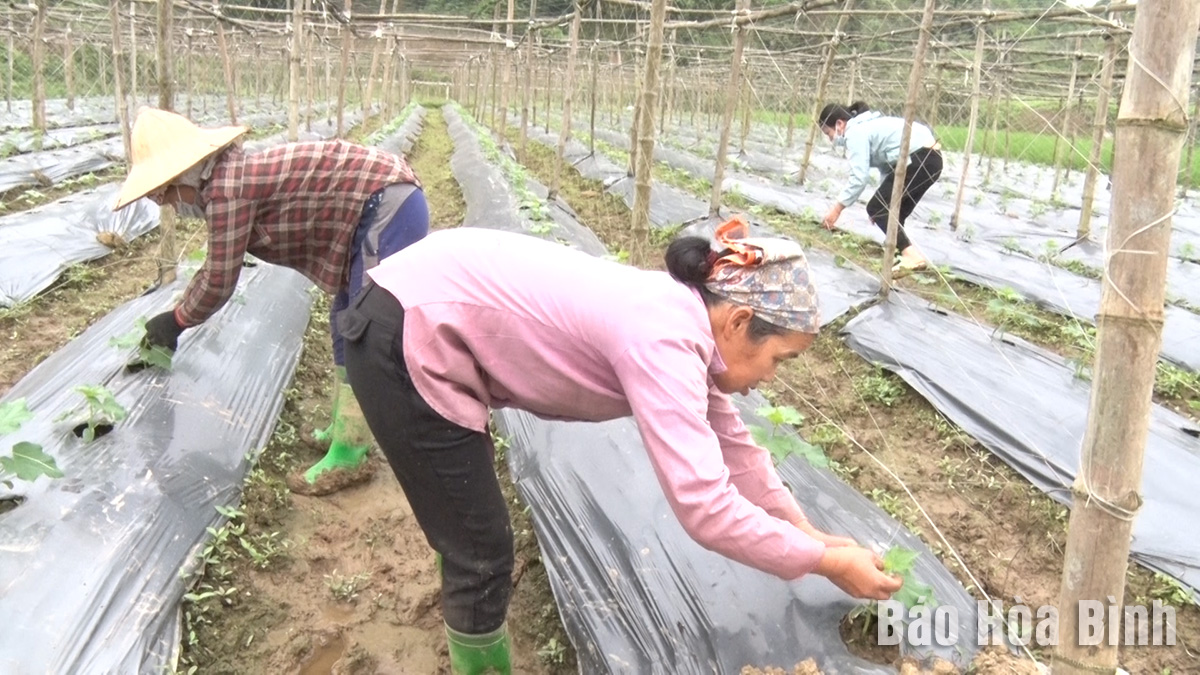
(HBO) - Kim Boi district has developed clean, safe agricultural production models in accordance with Vietnam's Good Agricultural Practices (VietGAP) in order to meet demand of consumers for a wide range of farming products while promoting sustainable agriculture and increasing incomes for farmers.

Members of Binh Son commerce, agriculture and services
cooperative, Binh Son commune, Kim Boi district take care of crops).
Along with safe vegetable production, oranges and pomelos are
key fruit trees of the district. The locality currently has more than 210
hectares under citrus trees, dragon fruit plants and vegetables of all types
meeting VietGap standards. It also has 34 hectares of longan meeting Global
Good Agricultural Practice (GlobalGAP) for exports.
In 2023, the district continues to support six local
agricultural products to obtain VietnamGAP and ISO
22000:2018certificates.
Nguyen Thi Minh Anh, deputy head of Kim Boi district’s
Agriculture and Rural Development Department, said that the locality has a
strength in agricultural development. Under the guidance of the district Party
committee, agriculture and rural development in the locality has received
attention, with several resolutions and projects promulgated to restructure the
agricultural sector.
She noted the department has proactively advised the district
People’s Committee to invest in infrastructure, development, establishing
production chain areas, products meeting VietGAP, one commune- one product
(OCOP) standards, helping to generating stable incomes for farmers.
Currently, the district has 16 production chains with an average
earning of a chain ranging from 50 million to 100 million VND (2,000 USD -
4,000 USD) per hectare a crop.
Promoting clean and safe agricultural production in accordance
with VietGAP standard has helped to increase productivity, product quality and
environmental protection.
The average income in the district reaches 48
million VND per person a year. The poverty rate is 17.61% while the share of
cultivation sector reaches 6.8% of the district's economy.
In the coming time, Kim Boi district will continue to support and encourage
people to apply technology to develop clean, safe and sustainable agricultural
production according to VietGAP standards. At the same time, the locality will
expand production chains to creat a solid fulcrum for farmers to develop a
variety of clean, safe agricultural products to supply to the market.
According to data from the Hoa Binh Provincial Party Committee, the industrial production index for the first six months of 2025 is estimated to have increased by 20% compared to the same period last year. This marks the highest year-on-year growth rate for this period since 2020.
In the first six months of 2025, Hoa Binh province’s export turnover was estimated at 1.145 billion USD, marking an 18.11% increase compared to the same period in 2024. Import turnover was estimated at $ 804 million, a 17.15% increase, which helped the province maintain a positive trade balance.
The lives of the ethnic minority farmers in Tan Lac district have gradually improved thanks to the new directions in agricultural production. This is a testament to the collective strength fostered through the professional associations and groups implemented by various levels of the district’s Farmers’ Union.
With the motto the "product quality comes first,” after nearly one year of establishment and operation, Muong village’s Clean Food Agricultural and Commercial Cooperative, located in Cau Hamlet, Hung Son Commune (Kim Boi district), has launched reputable, high-quality agricultural products to the market that are well-received by consumers. The products such as Muong village’s pork sausage, salt-cured chicken, and salt-cured pork hocks have gradually carved out a place in the market and they are on the path to obtaining the OCOP certification.
In the past, the phrase "bumper harvest, rock-bottom prices" was a familiar refrain for Vietnamese farmers engaged in fragmented, small-scale agriculture. But today, a new spirit is emerging across rural areas of Hoa Binh province - one of collaboration, organisation, and collective economic models that provide a stable foundation for production.
Maintaining growing area codes and packing facility codes in accordance with regulations is a mandatory requirement for agricultural products to be eligible for export. Recently, the Department of Agriculture and Environment of Hoa Binh province has intensified technical supervision of designated farming areas and packing facilities to safeguard the "green passport" that enables its products to access international markets.



